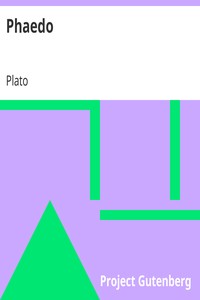Phaedo by Plato
"Phaedo" by Plato is a dialogue written in ancient Greece. In the final hours before his execution, Socrates debates the immortality of the soul and the nature of the afterlife with his friends. Through philosophical arguments with Pythagorean philosophers Simmias and Cebes, he explores whether the soul survives death and what awaits it afterward. The dialogue culminates in a mythological vision of the underworld and an account of Socrates' death. (This is
an automatically generated summary.)
Read or download for free
| How to read | Url | Size | |||
|---|---|---|---|---|---|
| Read now! | https://www.gutenberg.org/ebooks/1658.html.images | 288 kB | |||
| EPUB3 (E-readers incl. Send-to-Kindle) | https://www.gutenberg.org/ebooks/1658.epub3.images | 144 kB | |||
| EPUB (older E-readers) | https://www.gutenberg.org/ebooks/1658.epub.images | 146 kB | |||
| Kindle | https://www.gutenberg.org/ebooks/1658.kf8.images | 241 kB | |||
| older Kindles | https://www.gutenberg.org/ebooks/1658.kindle.images | 227 kB | |||
| Plain Text UTF-8 | https://www.gutenberg.org/ebooks/1658.txt.utf-8 | 251 kB | |||
| Download HTML (zip) | https://www.gutenberg.org/cache/epub/1658/pg1658-h.zip | 140 kB | |||
| There may be more files related to this item. | |||||
Similar Books
About this eBook
| Author | Plato, 428? BCE-348? BCE |
|---|---|
| Translator | Jowett, Benjamin, 1817-1893 |
| Title | Phaedo |
| Note | Death of Socrates 3 |
| Note | Wikipedia page about this book: en.wikipedia.org/wiki/Phaedo |
| Credits | Produced by Sue Asscher, and David Widger |
| Reading Level | Reading ease score: 68.6 (8th & 9th grade). Neither easy nor difficult to read. |
| Language | English |
| LoC Class | B: Philosophy, Psychology, Religion |
| LoC Class | PA: Language and Literatures: Classical Languages and Literature |
| Subject | Classical literature |
| Subject | Immortality (Philosophy) -- Early works to 1800 |
| Category | Text |
| EBook-No. | 1658 |
| Release Date | Mar 1, 1999 |
| Most Recently Updated | Jan 16, 2013 |
| Copyright Status | Public domain in the USA. |
| Downloads | 4947 downloads in the last 30 days. |
| Project Gutenberg eBooks are always free! | |

